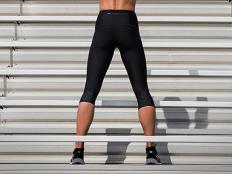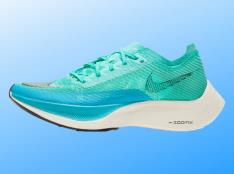Several other studies have been published to support that compression garments reduce post-exercise declines in jump height, minimize strength loss, decrease muscle edema (swelling), and ease muscle soreness (http://www.ncbi.nlm.nih.gov/pubmed/23007487, http://www.ncbi.nlm.nih.gov/pubmed/20195085, http://www.ncbi.nlm.nih.gov/pubmed/20376479).
In the instance of running, although anecdotal arguments exist to support that compression garments improve performance during an event, the literature proves otherwise. Compression calf sleeves did increase oxygen saturation of the blood in subjects at rest before the exercise and during the recovery process, but no improvements were observed in running performance or the time to fatigue in subjects wearing calf sleeves, according to Menetrier, A. Compression sleeves increase tissue oxygen saturation but not running performance.
One of the laboratories that reported a beneficial effect of compression garments on muscle recovery also evaluated well-trained endurance athletes during exercise. Results showed that subjects' ratings of perceived exertion, muscle soreness and time to exhaustion were unaffected by compression garments (http://www.ncbi.nlm.nih.gov/pubmed/20391083). Even though one report demonstrated an effect of compression garments on endurance running performance in athletes, the experimental design involved a custom designed whole body compression garment (full-length bottoms and long-sleeved tops).
In the article, The effects of whole-body compression garments on prolonged high-intensity intermittent exercise, by J.A. Sear, the practicability of this garment is questionable, and the improvements in total distance covered (less than 1/4 mile) and tissue oxygenation were modest. Similarly, although results from another laboratory indicated that wearing lower-body compression garments improved venous flow, the performance improvements were deemed trivial to athletes, as they did not correspond to improvements in endurance running performance (http://www.ncbi.nlm.nih.gov/pubmed/21725102).
When Should I Wear Them?
A review of the literature does indicate that compression garments have a place in sport, particularly for athletes who train and compete on a regular basis. While there are relatively few scientific reports of performance gains while wearing compression gear during competition, there is certainly compelling evidence to support that compression gear helps the recovery process.
More: 3 Common Running Injuries
Whether following a hard race, a long training run or a hard workout, compression garments can facilitate recovery and reduce post-exercise muscle soreness. The critical point to remember is the importance in allowing the body to incorporate necessary recovery strategies so that proper adaptation may occur.
While one would caution against constant use of compression gear, it does hold a place in the athletes' arsenal, similar to ice-baths, massage and nutritional supplements.
Also, keep in mind that these reports were conducted with newly purchased compression garments or custom made compression garments that delivered a specific level of pressure to the limb under investigation. Very few athletes who purchase compression gear for sport are aware of the pressure gradient or how well it is maintained during competition or over the life of the garment. Repeated washings and wear are sure to reduce the compression after just a few uses, subsequently altering their effect.
More: Prevent Running Injuries for Life
 Find the right essentials on GearUp.
Find the right essentials on GearUp.
- 3
- of
- 3
About the Author

Get ACTIVE on the Go


Couch to 5K®
The best way to get new runners off the couch and across the finish line of their first 5K.
Available for iOS | Android







Discuss This Article